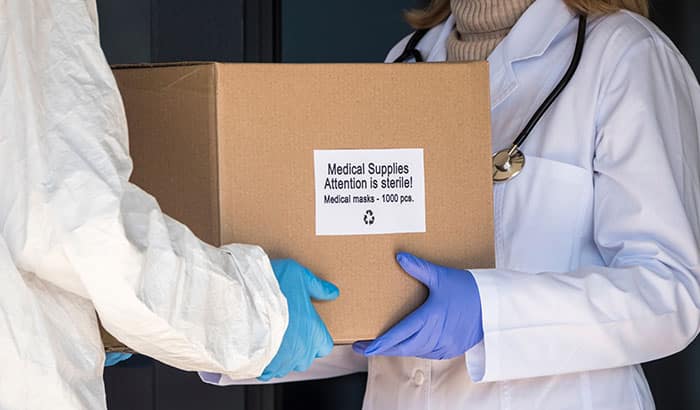The past two years have shown us how important it can be to have medical supplies on hand. You never know when you might be exposed or develop symptoms of COVID-19, even with up-to-date vaccinations and general safety precautions.
Many, if not all, of these supplies can be found at a local pharmacy or drug store. There is a good chance that most of these supplies are already in your medicine cabinet. But even if you currently have these supplies, it is always a good idea to throw away old or expired products and ensure you replenish your stores as they are used.
Some supplies are more helpful in preventing COVID-19 from impacting you and your household, and some help treat the symptoms of COVID-19 and prevent the illness from worsening.
Here are some of the most essential COVID-19 medical supplies to have on hand:
Thermometer
One of the most prominent symptoms of COVID-19 is an elevated body temperature. Monitoring your temperature is important, especially if you have been exposed or are experiencing other symptoms. If your temperature reaches 2 degrees above the average body temperature of 98.4, you are considered to have a fever.
If your temperature reaches 100.4 or higher, you have a fever and should most likely isolate yourself until you are fever-free for 24 hours.
There are many digital thermometers available. If you have small children or want a less invasive
thermometer, look for the kind that scans your forehead for a reading.
Gloves
Gloves are one of the first lines of protection against the transmission of COVID-19. The FDA provides a resource that answers many frequently asked questions about medical gloves and how the public should use personal protective equipment.
Even with gloves, it is essential to wash your hands frequently, including before and after you put gloves on. Be sure only to use each glove once and dispose of them properly after use. If you are interacting with more than one person or groups of people, change your gloves each time so you are not transferring the virus or other germs to other people.
Masks
Another line of defense against COVID-19 is wearing a mask. As the pandemic has continued, in conjunction with handwashing, masks have proven to prevent virus transmission and other illnesses when worn by the infected person and showing symptoms.
It is essential for those already infected with COVID-19 or who have been directly exposed to wear masks. Masks prevent transmission by protecting others from contracting the virus when an ill person is nearby.
For information on when and how to wear a mask, as well as the proper materials to use as a mask, see the CDC guidelines.
Disinfectants
Did you know there is a difference between sanitizing and disinfecting? The EPA breaks down the difference in more detail here, but primarily, the difference is that sanitizing only eliminates bacteria, while disinfecting gets rid of viruses and bacteria.
Both are important in preventing sicknesses from spreading or getting worse, but since COVID-19 is a coronavirus, the properties of disinfectants are even more critical than just sanitizing surfaces.
Whether using a disinfectant spray with a cloth, paper towel, or disinfectant wipes, be sure to allow the disinfectant to remain wet on the surface for at least 30 seconds before wiping it off or drying the surface. It takes 30 seconds to a few minutes for viruses and bacteria to be killed and eliminated by the disinfectant.
OTC Medicines
Unfortunately, there are no over-the-counter medicines that can treat the actual virus of COVID-19, but some medications can treat and help alleviate some of the symptoms of the virus.
Fever Reducers and Pain Relievers
Between the fever and aches and pains accompanying COVID-19, having some OTC medicines like acetaminophen (Tylenol) or ibuprofen (Advil/Motrin) can help you feel better. Naproxen (Aleve) is another possible pain reliever but may not be as effective against fever.
Decongestants
Decongestants or cough syrups can help soothe sore throats, suppress coughs, and eliminate congestion if you develop cold or flu-like symptoms. Again, these medications do not treat the virus but can help manage the symptoms of COVID-19 while your body recovers.
First-Aid
In addition to the medicines for COVID-19 symptoms, it can be helpful to have some general first-aid supplies on hand. Band-aids, Neosporin, alcohol wipes, gauze, etc., are all great to have available in case of minor accidents and injuries.
Hand Soap and Sanitizer
By far the best way to prevent illnesses from spreading is to adopt good hand-washing policies everywhere you go, including at home. Gloves can be effective in protecting you and preventing infection, but it is still crucial to wash your hands regularly with soap and warm water.
Hand sanitizer is also an option to help keep your hands clean and free of germs when it is difficult to wash your hands. Use enough hand sanitizer to rub over both of your entire hands. Make sure to apply it between your fingers and rub until your hands feel dry.
Tissues
COVID-19 is usually accompanied by coughing, sneezing, and sniffling. Having tissues readily available can make a big difference in recovering from the virus. If your face begins to feel irritated by the constant rubbing, look for tissues with added moisturizers. Be sure to dispose of tissues so that the virus and other germs don’t continue to spread.
Pulse Oximeter
Some medical professionals recommend using a pulse oximeter to monitor the oxygen levels in a person with COVID-19 symptoms. A pulse oximeter is a small device clamped onto your finger and registers your blood oxygen level. If a pulse oximeter reads less than 90, you should seek immediate medical care.
Allied
Stay safe with COVID-19 medical supplies from Allied. We provide both medical supplies and medical waste removal that are sustainable and benefit global communities. Contact us today for more information, including how to save up to 50 percent off when Allied buys out your current contract.

